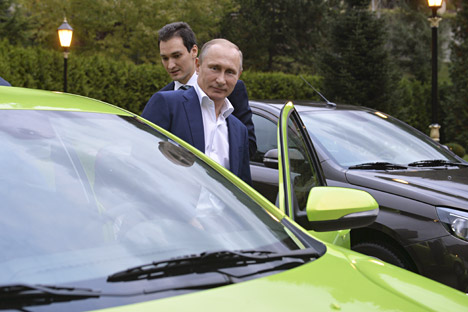
Russian President Vladimir Putin gets into an AvtoVAZ Lada Vesta before driving to attend a session of the Valdai International Discussion Club in Sochi, Oct. 22, 2015
ReutersDo you imagine we could be opposed to having democracy on our borders? What is it you call democracy here? Are you referring to NATO’s move towards our borders? Is that what you mean by democracy? NATO is a military alliance. We are worried not about democracy on our borders, but about military infrastructure coming ever closer to our borders.
I asked him: How would you react if we found armed opposition groups who are ready to confront and really fight ISIS? How would you react if we supported their efforts <…> He replied: I would take it positively.
The division of Syria is totally unacceptable. This will not resolve the conflict; the conflict will acquire a permanent character. Nothing good will come out of it.
I hope this [transfer of anti-air defense missile systems by the Americans to the Syrian opposition] is not going to happen. It will create danger also for American pilots; the American leadership are reasonable people, after all.
Does this [the creation of the U.S. missile defense system] not create a threat for us? Of course it does, and it changes the very philosophy of international security.
Recently the United States conducted the first test of the anti-missile defense system in Europe. What does this mean? It means we were right when we argued with our American partners. It was about an attempt to destroy the strategic balance, to change the balance of forces in their favor not only to dominate, but to have the opportunity to dictate their will to all. They were simply trying yet again to mislead us and the whole world [on Iran's nuclear problem]. To put it plainly, they were lying.
We contribute in the direction of Iraq by supplying weapons and ammunition. We cooperate not only by supplying arms and military equipment, but also by sharing information through a center established by representatives of Iraq, Russia and Syria. But we do not plan to expand it.
If we want to achieve lasting peace in the southeast of Ukraine and reconstruction of the country's territorial integrity, there is no other way except the implementation of the Minsk agreements.
They [the leaders of Germany and France] unequivocally support the Kiev authorities, but still, in my opinion, quite objectively assess the situation and understand that the problem <...> does not consist of two colors: white and black. Everything is much more complicated.
All rights reserved by Rossiyskaya Gazeta.
Subscribe
to our newsletter!
Get the week's best stories straight to your inbox